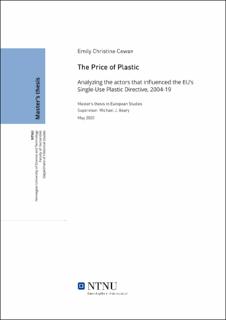| dc.description.abstract | This thesis is a study of the actors which influenced [Directive (EU) 2019/914] better known as the single-use plastic ban. The study is focused on the governmental and non-governmental actors which ultimately influenced the Directive’s creation. Document analysis provides a means to examine former environmental legislation within the EU, followed by an investigation of the Directive itself. The previous Commissions of Barroso (2004-14) and Juncker (2014-19) are also examined to determine their impact on the plastic waste management policy to come. The core of the thesis finds both external and internal actors to have had a profound influence on the Directive being passed. The most prominent external actor was observed in China's ban on the importation of plastic waste. This foreign policy actor was understood to be the most influential on the Directives creation, indicated by how the Directive forced the EU to turn inward and reflect on its own plastic waste management. The influence from ‘green’ member states, as well as the EU moving away from its dependency on oil and gas, were also examined in light of the Directive, yet found to be less conclusive. Finally, the internal or non-governmental actors which influenced the Directive are analyzed. This analysis found that Environmental NGOs and industry interest groups lobbied to influence the Directive. It was perceived that environmental NGOs had the most significant influence on the policymakers who compiled the Directive. This was found by comparing the nuances between the single-use plastic legislation and environmental NGOs' own policy goals. Individual ‘changemakers’ and the growing green movements across Europe were also examined as plausible influences on the Directive from non-governmental actors. It was uncovered that although these changemakers had a significant influence in terms of consenting to the single-use plastic ban, their influence on the Directives creation itself was less coherent. Despite these findings, it is understood that more research can be conducted to find the specific routes of influence on the single-use plastic Directive. Transparency between policymakers and interest groups is understood to be of utmost importance in future works. | |
